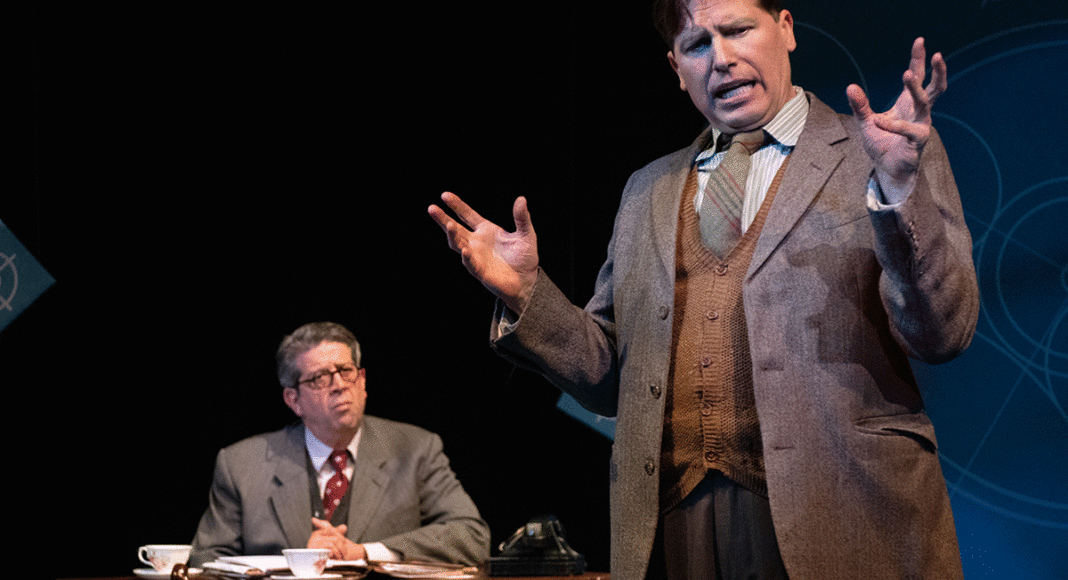Alan Turing has a vision of an “electronic brain”—or more precisely, a “digital computer”—that no one around him can comprehend. By the 1930s, Turing is already convinced that machines will one day be able to not only compute, but also to think and feel.
As told in the play Breaking the Code, which opened Friday at the Colligan Theatre, Turing is in the midst of mathematical research when he finds himself getting pulled into codebreaking work for the British government, a task that helps defeat Nazi Germany.
From the outset, Turing views the war as primarily “a most unfortunate interruption” of his work. In taking the job, he bristles at the notion that nationalism might have had something to do with his decision to face down the evils of Adolf Hitler. “Whenever I hear people appealing to my sense of patriotism,” he tells an administrator, “I feel that I’m being made to do something that I don’t want to do.”
Turing’s story, forgotten for decades, has seen a resurgence of interest, especially with the film The Imitation Game about how the mathematical genius’ code-breaking contributions helped win World War II.
To use an analogy from Turing’s time, the stage production of Breaking the Code plays like a vinyl record B-side to the popular film—less mainstream, but every bit as important and just as moving, if not more so. Cinematically, the 2014 biopic-like interpretation of Turing recounts a noble protagonist, detailing obstacles that he overcame to succeed—most notably outright homophobia and an antagonistic rival mathematician who stood in his path. Then at the end, that movie, which won an Oscar for Best Adapted Screenplay (and got nominated for seven others), quickly skims over Turing’s later legal struggles, his unfair treatment at the hands of a government that he’d saved from warring fascism, and also his tragic death.
Breaking the Code, which was first staged in 1986, tells a similar story more compellingly—in a sort of flashback-oriented, jumbled-up reverse. Opening with a slightly older Turing, the performance introduces audiences to a gentle man misunderstood in his time. It slowly weaves in glimpses of his earlier accomplishments, the grandest of which he’s forbidden from discussing with almost anyone.
In the Jewel Theatre production, nine large mathematical graphs lie splayed out around an appropriately sparse set, suspended from the walls and hanging from the ceiling, as if to bring the audience inside Turing’s brain. To create a sense of place, the light operator projects various images onto the screens, rooting each interaction in its own setting—a park set for a picnic, a cozy living room by the fire, a dreary office. From one scene to the next, the actors move across different quadrants of the stage, like thoughts ricocheting around the mind. The experience of the play captures the feeling of fragmented memories jetting back and forth through one’s consciousness, some of them pleasantly soothing and others less so.
Away from work, Turing struggles in many of his relationships. He finds himself shaken by the death of a friend from his youth and weighed down by the pressure to transform his own life into something that much more impactful in order to fill the void left by his former companion.
The Hollywood Alan Turing played onscreen by Benedict Cumberbatch four years ago served audiences a stoic and dashing version of the mathematician—slightly quirky, but for the most part unflappable. The Breaking the Code interpretation, played here by David Arrow, is a more cantankerous, impatient intellectual frequently biting his fingernails or stumbling over his own nervous tics.
Lacking in social graces, this Turing doesn’t relate easily to others, and yet he comes across as real and relatable to all of us. In telling his story, both acts of Jewel Theatre’s latest production open a window into one man’s brilliance—as well as the intensity and heartbreak that sometimes accompany it.
‘Breaking the Code’ by Hugh Whitemore runs at the Colligan Theatre through April 14. jeweltheatre.net.













